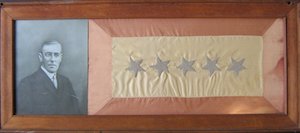
Photograph and pennant commemorating the service of the Frank Mendosa Family during World War I. The pennant was presented to Frank Mendosa, Sr. for having five sons serve in the Armed Forces during a time of war. On the left side is an official photograph of President Woodrow Wilson, and on the right side is the pennant of white satin with a red border. Five stars are sewn on the pennant to signify Frank Mendosa’s five sons: Antone Joseph, John S., Joseph Albert, Frank Jr., and William Arthur. This framed pennant hung over the cash register of Mendosa’a Hardware store until 2006. (Gift of Jeanette Hansen, Jeanette Mendosa Hansen Collection)
One hundred and three years ago today, on February 14, 1919, the Mendocino Study Club held a special evening meeting to celebrate both the triumph of Cupid and the end of World War I. The armistice with Germany had been signed November 11, 1918, and the Paris Peace Conference had begun on January 18, 1919, so the Study Club event was timely. Almost three million American men had served in World War I — including a number from little Mendocino — and their return home from the trenches no doubt seemed like both a boon and a valentine.
According to “Mendocino Study Club Entertains on Valentines Day” (Mendocino Beacon, February 22, 1919, page 1), the gathering was so unique that the married women club members invited their husbands to attend. The hostess, Mrs. John S. Ross, welcomed the guests into her home [now the Ford House] for the program, then arranged tables for cards, and served a “bountiful repast” to round out the event.
The program, directed by the Misses Helen Hodghead and Clarisse Duckett, teachers at Mendocino High School, featured war poems by Robert Service “read with deep feeling and expression” by four of the club women, a humorous monologue, and war songs. The Beacon article only hints at the texts under interpretation, but a little background research sheds some light.
The poems by Service, a British-Canadian writer sometimes referred to as “the Bard of the Yukon,” came from Rhymes of a Red Cross Man, written after he served as an ambulance driver in the Great War. Service is best known for his poems, “The Shooting of Dan McGrew” and “The Cremation of Sam McGee,” penned while he was a bank officer during the Klondike gold rush, but his war poems are considered somewhat superior to his Yukon doggerel. Somewhat.
From wrath-red dawn to wrath-red dawn,
The guns have brayed without abate;
And now the sick sun looks upon
The bleared, blood-boltered fields of hate. (“The Lark”)
Or
My stretcher is one scarlet stain,
And as I tries to wipe it clean,
I tell you wot — I’m sick with pain
For all I’ve ‘heard, for all I’ve seen. (“The Stretcher-Bearer”)
When the poetry readings ended, the assembled were understandably in need of some uplift, and Miss Grubb “delighted” them with her monologue, “Helping Win the War.” Unfortunately, no trace remains — in the 1919 Study Club yearbook in the Kelley House Museum archives or in cyber space — of her comedic bit, but Clare Grubb was also a teacher at the high school, so we can surmise that it was learned and witty.
To wrap up the program, the audience launched into songs the Beacon says were “characteristic of the ‘Over There’ and ‘Over Here’ spirit.” The jaunty tune and clever lyrics of George M. Cohan’s “Over There” are familiar to most of us: “The Yanks are coming…and we won’t come back til it’s over, over there.” But Edward Laska’s “Over Here or Over There” has been nearly forgotten, and you can see why: “Over here we can help them over there. Over here we have got to do our share. Though you’re not behind a gun, you can help to whip that Hun.”
On that high note, the group adjourned first to the card room, and then the dining hall where, “seated at artistically decorated tables, the guests partook of delicacies such as only Mendocino ladies can prepare.” All present agreed that the gracious hostess should be congratulated for “the very mirthful and joyous evening.” And why not: the war to end all wars had ended, the doughboys were coming home, and it was Valentine’s Day.
Ladies of the Afternoon by Jean Droz and Janet Barnes – This Kelley House Museum Review covers the history of the Mendocino Study Club over its 100 years of club activities and community projects. 20 pages. $12.